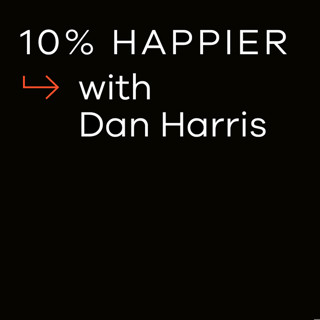
Do You Want to Be Happier or Not? | Mushim Patricia Ikeda
New episodes come out every Monday, Wednesday, and Friday for free, with 1-week early access for Wondery+ subscribers. --- Oftentimes Buddhism can take a tough love, no nonsense approach to happiness by saying, if you want to be happier, sometimes you need to face hard truths. In today's episode we’re going to talk about a Buddhist list called The Three Characteristics. These are the three non-negotiable truths about reality, which you have to see and understand in order to be happy. Granted, when looked at from a certain angle, these truths, or characteristics of reality can suck at times. But do you want to see the truth of things or not? Do you want to be happier or not? Our guide through these three characteristics is the mighty Mushim Patricia Ikeda. Mushim has a background in both monastic and lay Buddhist practice and is a core teacher and community director at the East Bay Meditation Center in Oakland, California. This is her second appearance on the show. Content Warning: This episode briefly mentions child loss. In this episode we talk about: The three characteristics, alternatively known as the three Dharma seals Our conflicted relationship to change Our brain’s tendency to focus on the negative Practices that can help with handling change more effectively How not taking your thoughts so personally can build your resilience And why Mushim believes that universal non-discriminating love is synonymous with Nirvana Full Shownotes: https://www.tenpercent.com/podcast-episode/mushim-patricia-ikeda-484
3 Aug 202259min

Four Ways to Boost Your Mindfulness Muscle | Joseph Goldstein
New episodes come out every Monday, Wednesday, and Friday for free, with 1-week early access for Wondery+ subscribers. --- These days, the word mindfulness has become a buzz phrase but very often people don’t know what the word actually means, much less how to practice it. One simple definition of mindfulness is the ability to see what’s happening in your mind without getting carried away by it. The benefits of doing so are vast and profound— from decreased emotional reactivity to being more awake to what’s actually happening in your life. Today's guest Joseph Goldstein talks about a classic Buddhist list called the four foundations of mindfulness, which lays out various techniques for developing mindfulness within your practice. Goldstein is one of the premier western proponents of Mindfulness. He co-founded the legendary Insight Meditation Society alongside Sharon Salzberg and Jack Kornfield. He also wrote a book called Mindfulness: A Practical Guide to Awakening. In this episode we talk about: The historical context for the four foundations of mindfulness Why he thinks the Buddha loved lists Why the Buddha placed mindfulness of the body first on the list The steps to mastering mindfulness of the body The meaning of the word embodied and how that’s different from our usual mode of being in the world How and why to do walking meditations What are feeling tones and why are they important Practices for cultivating mindfulness of mind And we talk about some of the mantras that Joseph uses when teaching Full Shownotes: https://www.tenpercent.com/podcast-episode/joseph-goldstein-483
1 Aug 20221h 7min

How to Break Bad Mental Habits | Carol Wilson
New episodes come out every Monday, Wednesday, and Friday for free, with 1-week early access for Wondery+ subscribers. --- There are so many benefits to mindfulness with one of the biggest being the cultivation of more self-awareness. This cultivation can lead to identifying the unhelpful mental habits that can develop over the years. Today we’re going to talk to Carol Wilson who offers very clear and practical ways that Buddhist meditation can help us turn down the volume on our unproductive mental habits and be less reactive. Wilson is a guiding teacher at the Insight Meditation Society, where for many years she has taught their annual three-month retreat. She began her insight meditation practice in 1971 in India and in the 1980s she spent a year in Thailand as a Buddhist nun. In this episode we talk about: How to be mindful throughout the day The concept of 360 degree awareness Noticing when one experiences wanting or aversion Why Wilson believes that the root of suffering comes from making it all about us How seeing torment can help us experience freedom from the self The benefits of reflecting on your past acts of generosity Bringing awareness to your motivations And doing a gratitude practice regularly to change the weather pattern in your mind Full Shownotes: https://www.tenpercent.com/podcast-episode/carol-wilson-481
27 Juli 20221h 3min

What is Sadness Good For? | Susan Cain
New episodes come out every Monday, Wednesday, and Friday for free, with 1-week early access for Wondery+ subscribers. --- Many of us may have a reflexive reaction when we notice we’re feeling down: we want it to go away. Maybe we think something is wrong with us and we automatically self medicate in any number of ways. But how do we square this with the fact that many of us may also really like sad movies and music? And making things even more complex, how do we compute the fact that the universe is constantly handing us opportunities to feel awe, gratitude, and joy, often at the exact same moment that sadness arises? What’s going on with this complex and conflicted relationship we have with a perfectly normal human emotion? Our guest today Susan Cain has written a whole book about this called Bittersweet: How Sorrow and Longing Make Us Whole. In this book, she explores how the capacity to tune in to the inherent joy and sadness of the human situation can be a superpower for connection. In this episode we talk about: Whether bittersweetness is a skill you can hone The relationship between bittersweetness and the Buddhist concept of impermanence Why we feel embarrassed about discussing sorrow and longing How sadness can be transmuted into creativity, and how that creativity can lead us out of sadness And how America, a country founded on so much heartache, turned into, in her words, “a culture of normative smiles” Full Shownotes: https://www.tenpercent.com/podcast-episode/susan-cain-480
25 Juli 202258min

How to Outsmart Your Pain | Christiane Wolf
New episodes come out every Monday, Wednesday, and Friday for free, with 1-week early access for Wondery+ subscribers. --- Sit in meditation for a few minutes and you’re likely to experience pain, either physical or psychological. Hang around the meditation scene for very long, and you are likely to hear the expression, “Pain is inevitable; suffering is optional.” And that’s what this episode is all about— boosting your pain tolerance through meditation. Because pain really is inevitable, but can you reduce your suffering through mindfulness and compassion? Our guest today, Christiane Wolf, argues ‘yes’. She is a physician turned mindfulness and compassion teacher and teacher trainer. She is an authorized Buddhist teacher in the Insight (Vipassana) meditation tradition, teaching classes and retreats worldwide, and she’s also the author of Outsmart Your Pain: Mindfulness and Self-Compassion to Help You Leave Chronic Pain Behind. In this episode we talk about: Meditation techniques that offer us a better relationship to pain How to work with the physicality of pain The stories we tell ourselves about our pain And seeing pain as an opportunity Full Shownotes: https://www.tenpercent.com/podcast-episode/christiane-wolf-rerun
20 Juli 202250min

Why You Keep Repeating Painful Patterns | Radhule Weininger
New episodes come out every Monday, Wednesday, and Friday for free, with 1-week early access for Wondery+ subscribers. --- We all have long-standing painful patterns of behavior or inner storylines that can cause us to react disproportionately or inappropriately to everyday events. Today's guest, Dr. Radhule Weininger, has a term for this. She calls them longstanding recurrent painful patterns or LRPPs. Weininger is a clinical psychologist, psychotherapist, and teacher of Buddhist meditation and Buddhist psychology. She has a new book, Heart Medicine: How to Stop Painful Patterns and Find Peace and Freedom—at Last In this episode we talk about: How to recognize a problematic pattern or when you’ve been “lrpp-ed” Why Dr. Weininger believes that Buddhism and western psychology, when practiced together, can help us deal with these recurring patterns Unpacking the word trauma The psychological term “mismatch” and how it relates to childhood trauma or hurt How to practice meditation in order to tolerate discomfort Full Shownotes: https://www.tenpercent.com/podcast-episode/radhule-weininger-478
18 Juli 20221h 5min

How to Actually Be Present | Matthew Brensilver
New episodes come out every Monday, Wednesday, and Friday for free, with 1-week early access for Wondery+ subscribers. --- Today we’re gonna tackle one of the best known contemplative clichés: being in the present moment and inhabiting the now. The present moment seems to be a state we aspire towards, but are rarely given practical information about how to actually achieve. But today’s guest, Matthew Brensilver offers just that— practical information on how to achieve being present. We also explore his argument that when painful memories surface in meditation, it acts as a kind of exposure therapy that acclimates us to the things we may not want to face. This is Matthew Brensilver‘s second appearance on the show. He teaches retreats at the Insight Retreat Center, Spirit Rock and other Buddhist centers. Before committing to teach meditation full-time, he spent years doing research on addiction pharmacotherapy at the UCLA Center for Behavioral and Addiction Medicine. Matthew is the co-author of two books about meditation during adolescence and continues to be interested in the unfolding dialogue between Buddhism and science. In this episode we talk about: What “be present” actually means What to do when Buddhist teachings or meditation instructions feel out of reach and when we start compulsively self-assessing against them What to do when a memory arises in meditation, especially a difficult memory The brain’s tendency toward constant prediction The benefits of meditation retreat And distinguishing between true alarms and false alarms Full Shownotes: https://www.tenpercent.com/podcast-episode/matthew-brensilver-476
13 Juli 20221h 6min

Run Towards the Danger | Sarah Polley
Often, when you’re afraid of something, the best advice is deeply counterintuitive, not to mention inconvenient: to turn toward the source of your fear. Today we’re going to talk about the fear of confronting your own past with our guest Sarah Polley. Polley is an Oscar nominated filmmaker and actress who recently wrote a new book, called Run Towards the Danger: Confrontations with a Body of Memory. In her book, she explores the relationship between her past and present and how the two are in constant dialogue. In this episode we talk about: The story of her concussion and the unusual advice she got from a specialist that became not just a path to recovery, but a sort of personal credo, “run toward the danger” What we often do with our stories of childhood shame, and the immense power of talking about it How she has come to stop seeing her anxiety as a stop sign Her argument that the advice to “listen to your body” is not always the best advice The liberating potential of intentionally making uncharacteristic decisions Her path to meditation and her current practice And the limits of her own “run towards the danger” mantra Full Shownotes: https://www.tenpercent.com/podcast-episode/sarah-polley-475
11 Juli 20221h 4min





















